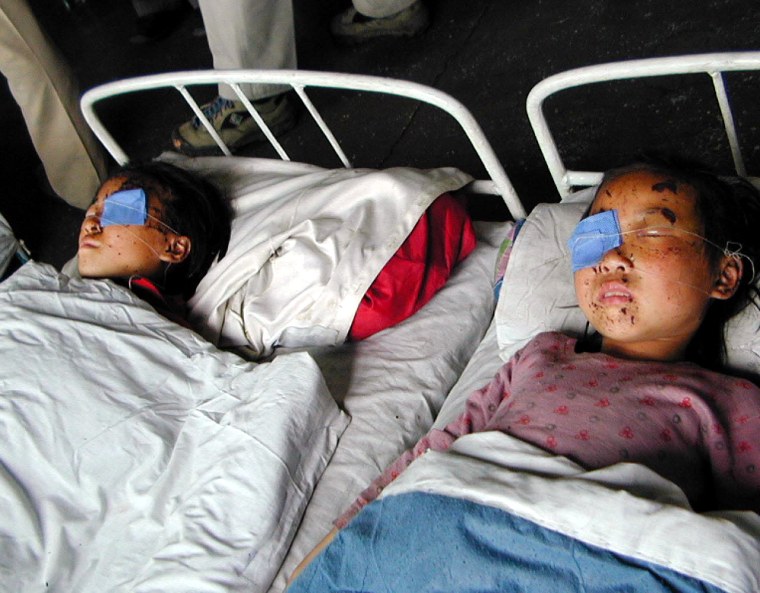A South Korean ship loaded with instant noodles sailed North on Wednesday to help victims of last week’s train blast, as Seoul moved to meet Pyongyang’s request for building materials and school supplies.
At least 161 people died and 1,300 were injured in Thursday’s blast, which the official KCNA news agency said had the force of 100 one-ton bombs and caused “horrible” damage in a 2.5-mile radius in Ryongchon on the Chinese border.
“(The) strong explosion left many inhabitants blind and deaf,” it said. Children are among the injured, aid workers say.
Aid from China and Russia has reached North Korea by land and air, and many other countries have offered help. More is on the way from Japan and the World Health Organization. The United Nations appealed urgently on Tuesday for 1,000 tons of food.
A spokesman for the International Federation of Red Cross and Red Crescent Societies said in Beijing that global relief agencies had met emergency needs for medical supplies at Ryongchon, but that authorities were having difficulty sheltering those made homeless by the blast.
“There is evidence that some people are, what we feared very early on, back on the streets,” said Red Cross spokesman John Sparrow. “They’ve got tarpaulins as shelter.”
He said the 479 patients were spread over six hospitals in the disaster area, with their conditions changing rapidly.
“Our impression is that perhaps as many as two-thirds of the serious cases involve children,” Sparrow said. He said that the Ryongchon crisis was taxing aid groups’ supplies in North Korea.
But almost a week after two trains carrying fertilizer and fuel exploded during what KCNA said was careless shunting, South Korea has been unable to get its supplies in by road or air.
South Korean television showed one ship leaving the west coast port of Inchon for Nampo in North Korea around noon. It was expected to arrive around 10 p.m. (9 a.m. EDT).
Officials said the ship was carrying 100,000 instant noodle meals, water, blankets, clothing, first aid kits, medicine and medical instruments from the government. A second ship carrying charity aid was scheduled to leave later in the day.
The secretive, reclusive North has accepted both shipments. South Korea took steps on Wednesday toward fulfilling Pyongyang’s main request, with the government holding discussions with political parties.
'Who will accept such excuses?'
“The government is positively weighing the North Korean request with a view to meeting it as much as possible,” Foreign Minister Ban Ki-moon told a news conference.
The North has asked for building materials, bulldozers, school blackboards and 50 televisions. The South offered first aid and medical teams, but Pyongyang said it had enough.
Yonhap news agency reported that Unification Minister Jeong Se-hyun had told the leader of the main opposition party: “Now that medical supplies are provided by a number of countries and organizations, the South can send building materials and food.”
Jeong was quoted as saying that the government planned to send goods worth 25 billion won ($21.7 million). A ministry spokesman said no final decision had yet been made on the North’s list of 13 categories, including fuel, excavators and steel.
South Korean media were critical of the North’s attitude.
“Taking into account the North’s situation, who will accept such excuses?” said the JoongAng Daily in an editorial.
“Of course, the North is worried about the impact on its regime after South Korean medical teams treat the victims with advanced equipment. But the North must think first about the magnitude and severity of this disaster,” the newspaper said.
The left-wing Hankyoreh said it was frustrating but Seoul should respect the North’s request “with a generous heart even if the situation is slightly unlike how we’d prefer it to be.”
North Korea expert Paik Hak-soon of the Sejong Institute in Seoul said the North was reluctant to open its doors and resentful of South Korea’s close ties with the United States.
“North Korea still does not want to show its internal situation to outsiders,” he said.
Paik said North Korea expected broader support from far wealthier South Korea. “Also South Korea has consistently sided with the U.S. in dealing with the nuclear crisis, which could make the North hesitant to accept delivery of goods by land..”
